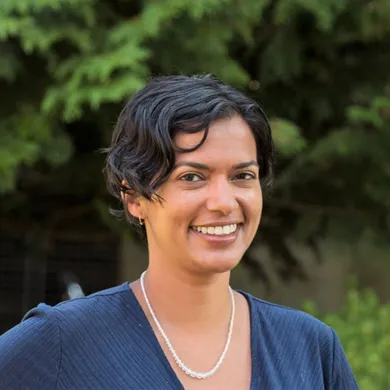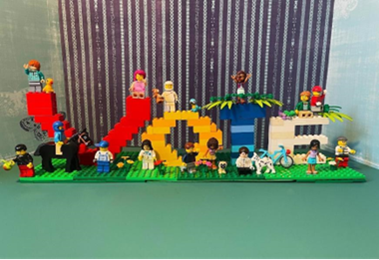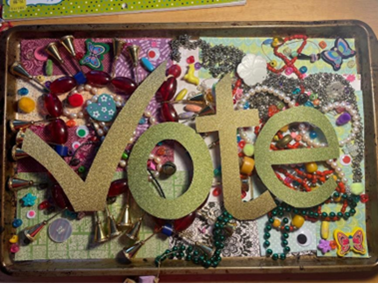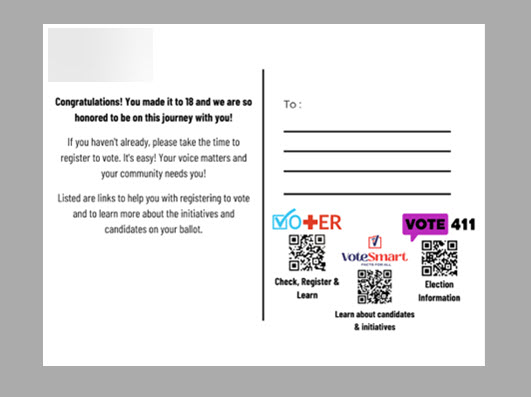On Burnout, Efficacy, and Believing We Can Do Better: Musings on a Home-grown Get Out the Vote Campaign

Amrita Stark, MD, FAAP
October 17, 2024
Recently, a 12-year-old shared that in addition to being afraid of monsters under her bed and being alone, she was worried about inflation, the cost of college, and the right to have an abortion.
A couple of months ago, a 16-year-old asked me, what’s going to happen if they take birth control away?
I tried to reassure her saying many things would need to happen before that could be the case. Days later, I realized that the Supreme Court reversal of the Chevron case put federal agency oversight at risk to the whims of the judicial system in all areas of life including health care.
These kids teach me every day. As a primary care pediatrician, they also break my heart every day, make me laugh, and put me in my place.
For all my colleagues out there, running on fumes and trying to do all the things - keep up with guidelines, be the best doctor for your patients, and take care of yourself and your family – the list goes on - this blog post is dedicated to you.
I used to be the first one in, last one out until recently when I realized the toll work was taking on my mental and physical health and my family. Playing martyr did not make me a better doctor, partner, parent, or human.
Like most doctors in the last five years, I have contemplated exiting clinical medicine. I posted my resume, talked with a friend who has pursued all manner of nontraditional jobs in medicine, and listened to podcasts about wellness.
But here I am. Feeling it out day by day.
My guiding light: the kids and their families.
Another sustaining joy of my practice: health equity and advocacy.
This has taken many forms including starting an internal work group, changing workflows, doing training with staff, and getting out into the community. It has been challenging work to be as consistent and effective as I think I should be. Even so, the wins are invigorating despite seeming small in the sea of inequity and exclusion we face and perpetuate in health care. We have changed how we access interpreters for families who call, we talk about racism with our families, most of our Reach Out and Read books are bilingual, and we make equity and access a question we address with every quality assurance initiative.
We started working with VotER in 2020. Our providers have their badges with handy QR codes to help families register to vote and we also have their posters up in our offices.
This January, when the whole county was iced in, I was thinking about the election and the state of the country. More and more anti-diversity, equity, and inclusion legislation, more anti-reproductive rights laws, more book bans, more anti-LGBTQ initiatives.
I thought about how I could relate to the young people who were not inspired by the presidential election.
So, I started to play with Legos, beads and glitter and I made the following.


What if we reach out to our patients, the kids, and remind them to register, remind them that their voices matter?
We started a postcard campaign. Providers signed cards we mailed off to our patients who will be of age to register this November. We’ve been talking too at our well care visits. I even bugged a kid with an ingrown toenail about voting.
Let me tell you, from the heart, having these nonpartisan conversations and even writing a quick message to kids you know is life-affirming, hope-giving.
It revives the part of my soul that dies with every click in the EMR and prior authorization request that floods my inbox. It makes me feel the privilege of my work even when I am up late catching up on notes while listening to bad suspense novels on Audible.
And the kids, the families, they are listening!
At first it may seem random when kids are used to the usual script and debates with their parents about whether they sleep enough, eat vegetables, and whether they should wait for another day for vaccines because of soccer practice or a birthday party. They are surprised but they engage. They feel seen.
In addition to sharing the QR code for VotER; we also have shared the codes for vote411 and VoteSmart non-partisan sites that help voters know what and whom is on their ballot.
I had a teenage patient - who usually barrels into my office, often appalling me with her self-assured risk-taking and rules-be-damned mindset - seem downright demure when I brought up voting. In a quiet voice she said, “Maybe next year, I’m not grown up enough for that. I don’t know anything.”
I shared that most of us feel that way; we are all learning.
There is so much at stake during this election nationally but also at the local level. Ten states are addressing abortion protection; anti-DEI legislation is already in place in 28 states, book bans are active in 42 states, and more than 140 anti LGTBQ laws have either advanced or passed in state legislatures across the nation.
In my community, elections for senator, house representative, state representatives, state senator and governor are all on the ballot and will have a huge impact on the lives of Washingtonians.
But there's more to building a sustainable equitable society than any one election. We need community, civic engagement, people to believe in their own efficacy. And we have the power to create and nourish this, conversation by conversation.
Burnout is about powerlessness as well as overwhelm and poor self-care. Finding your voice and using it is just as important as eating your veggies, getting 30 minutes of daily movement, and eight hours of sleep.
Every day as doctors, parents, sisters, brothers, children, humans, we can only do what we can do. We fail a lot. We also succeed. Most importantly, we learn. Learning, listening, and action; I think that is the only way forward for our heartbroken, war-torn, lonely, and environmentally ravaged planet.
This VoteCard campaign is yours to share, alter and revamp how you please.

*The views expressed in this article are those of the author, and not necessarily those of the American Academy of Pediatrics.
About the Author
Amrita Stark MD FAAP
Amrita Stark MD FAAP is a general pediatrician in the Northwest. Her community practice is committed to serving all children regardless of insurance type. Dr. Stark works on Health Equity and Advocacy in her clinic and community. When not working or thinking about working, she enjoys reading, writing, making art, exploring, and spending time with her family and friends.